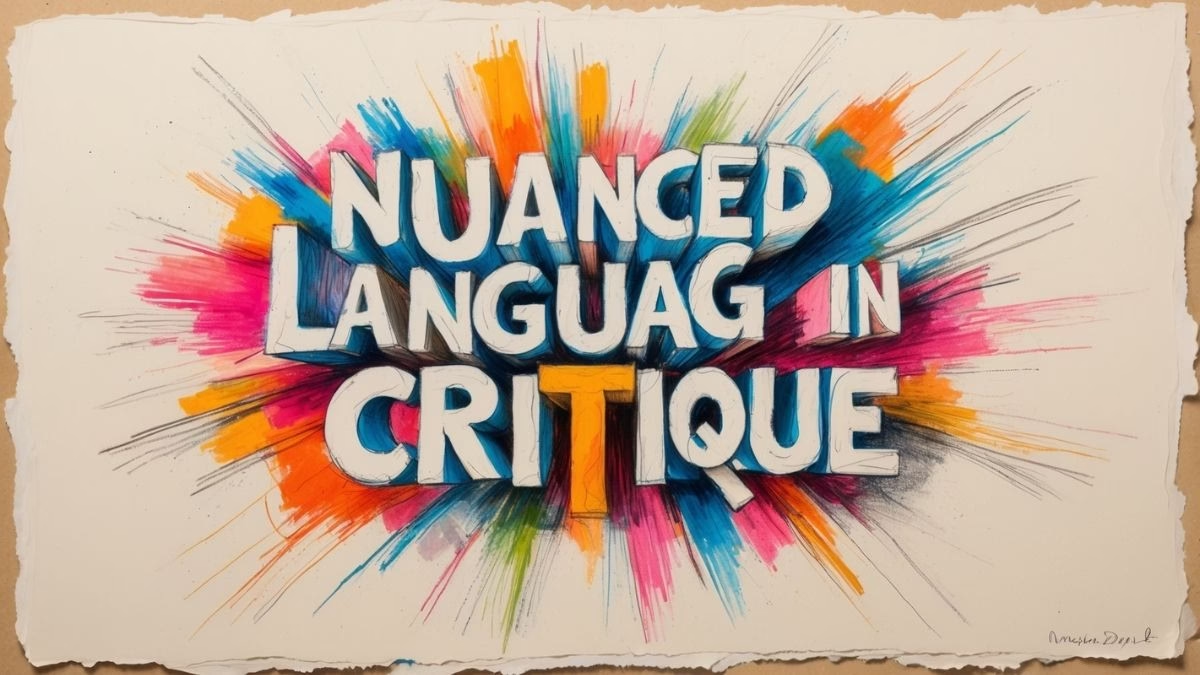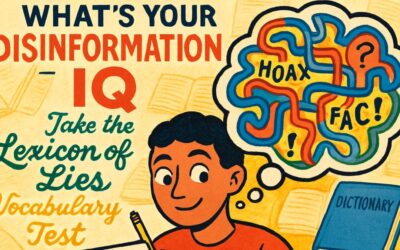Audio Episode
[ppp_patron_only level=5]
The Vocabulary of Intelligent Critique Transcript: Click to Open
Have you ever struggled to put your finger on why something didn’t quite work beyond just saying it was bad or maybe felt a brilliant idea deserved a bit more than just it was good? Right. Or do you want to sound discerning, not just negative, to really articulate what makes an argument brilliant or maybe subtly flawed? What is the difference between something perfunctory and, well, just plain lazy? Today we’re embarking on a deep dive into the words that can elevate your opinions, turning them into truly intelligent critiques. We want to give you the linguistic tools to see and explain the world, maybe a bit more precisely.
Think of it like upgrading your mental toolkit, moving from blunt instruments to a full set of precision tools. Exactly. And for those who love to solidify their understanding, this deep dive is perfectly designed to set you up for our accompanying English Plus learning quiz, where you can really test what you learn.
Welcome to a new introduction to a learning quiz from English Plus Podcast. What you’re going to listen to is to help you ace the quiz. But if you prefer to attempt the quiz right away, you can do that because we have added hints and feedback for every option.
And that’s what makes it a learning quiz and a fun one, if you ask me. But now let’s talk a little about what you may learn from this quiz. So our mission today is to explore how mastering some very specific vocabulary can, well, profoundly transform the way you express your opinions.
We’re moving beyond simple likes and dislikes into the realm of sophisticated, insightful critique. Exactly. And these aren’t just, you know, new words to add to your list.
They’re genuinely powerful tools. They allow for immense precision and thought and expression. Knowing the nuance between, say, an argument that is tenuous versus one that is just weak.
It’s not just about language precision. It’s almost like developing an internal warning system. A warning system.
How so? Well, a tenuous argument isn’t just flimsy. It’s often deceptively so. It might present itself as solid, but it’s really built on a house of cards, spotting that lets you avoid committing time, resources, maybe even belief to something fundamentally unstable, whether that’s a business pitch or, I don’t know, a political claim.
It really changes how you assess risk, how you see the world ultimately. OK, let’s unpack this then. We’re talking about words that are, well, truly some of the most powerful tools you can have in your linguistic arsenal.
They don’t just describe, they dissect. And like you said, they let you move from a kind of generic observation to a detailed, maybe even actionable insight. And what’s fascinating here is how these words let us pinpoint exact strengths or weaknesses.
They add these unique shades of meaning. It really is like upgrading your mental toolkit from just a hammer to a full set of precision instruments. Surgical analysis on us.
All right. So let’s start with the positive. If you want to commend work that goes beyond just good, something truly exceptional, what words really capture that? How do you explain why it stands out? Well, imagine you’re looking at a groundbreaking research paper.
You might call it seminal. Seminal. Yeah.
It means it’s so original and influential. It literally plants the seeds for future research. It’s not just good.
It defines a field. It changes the landscape. Wow.
Okay. Big impact. Huge.
And the arguments within it, maybe they’re incredibly cogent. That means they’re not just logical. They’re brilliantly clear and convincing.
They have this undeniable intellectual force makes you think, yes, that’s exactly it. Right. That aha moment you get when an argument just clicks perfectly.
It’s cogent. That clarity and force. Absolutely.
Spot on. And an author’s analysis could be insightful, showing a deep, perceptive understanding that goes way beyond the obvious. Seeing connections others miss.
Precisely. Offering a fresh perspective that genuinely illuminates the subject. And if the writing itself is just beautiful, brings the subject to life, you call it evocative.
Evocative. Creates a vivid picture. And if the author’s effort, maybe their moral purpose, is really worthy of praise, we use words like laudable or commendable.
So instead of just saying, I like the research paper, which is fine, but- A bit basic. Yeah. You can now explain why it’s influential seminal.
Why it’s persuasive cogent. Why it’s perceptive insightful. Or why it’s masterfully written evocative.
That’s a huge step up in communication, isn’t it? It’s incredibly empowering to articulate why something truly shines. It moves you beyond just, I liked it. But what about the other side of the coin? True discernment isn’t just about recognizing brilliance.
It’s about navigating flaws without resorting to just simple dismissal. Exactly. And this is where I think the challenging art of negative critique comes in.
Nuance here is absolutely everything. You want to be discerning, not just sound negative. So how do we do that? Well, think about, say, a new action movie that feels strangely familiar.
You could say its plot is derivative. Derivative. That’s a precise way of saying it’s unoriginal.
It borrows too heavily from other sources. It’s not necessarily bad, maybe, but it lacks that innovative spark. Lacks originality.
Got it. Or what if you read a report that’s technically complete, but it just feels lazy, soulless, like it was done with minimum effort? Yeah, I know the type. The perfect word is perfunctory.
It hits the marks, sure, but with no real care. It indicates a lack of genuine engagement. Perfunctory.
I like that. It’s specific. Very.
And if, say, a business plan is full of buzzwords but is ultimately built on a fragile, unproven idea, you can describe its core logic as tenuous. Tenuous. So weak, fragile.
Exactly. It’s barely holding together. Could crumble under scrutiny.
I can really see how using words like derivative, perfunctory, or tenuous would instantly change how people perceive your feedback. It makes you sound much more thoughtful. Right.
Like you’ve really considered the nuances rather than just reacting. Suggests you’re an analyst, not just a critic. It really shows you’re engaging with material on a deeper level, doesn’t it? Not just reacting superficially.
Okay, we’ve talked about critiquing works generally. But arguments, especially the ones we encounter daily, maybe in the news or on long debates, they feel like a different beast. They often sound convincing at first glance.
They do. How do we as listeners or readers really dissect them, pinpoint the flaws with precision beyond just a gut feeling? Ah, yes. We have some excellent words for that.
An argument that is logically indefensible, I mean, it simply cannot be defended against objection is untenable. Untenable. So you just can’t stand on that ground logically.
No leg to stand on. Exactly. It’s a position that cannot be maintained.
Now a more slippery type of argument is one that sounds convincing at first, but is actually based on flawed logic. This is a specious argument. Specious.
Okay, how’s that different from just wrong? It has a deceptive appeal. It often masquerades as truth. It looks good, but it’s rotten underneath.
So what’s fascinating there is that specious actually acknowledges that initial appeal, which is, I guess, crucial for dismantling it, isn’t it? It’s not just wrong. It’s deceptively wrong, kind of designed to mislead. How does knowing these terms help you evaluate the information you encounter daily, especially online maybe? Oh, massively.
It makes you a much more critical consumer of information. You start to see beyond the surface gloss. You question the underlying premises rather than just accepting what sounds good initially.
Right. Let’s shift gears a bit. Let’s talk about critiquing the style of a work, not just its content, because sometimes the message might be sound, but the delivery just falls flat.
Absolutely. Happens all the time. A book that’s factually accurate, but just dull, unimaginative in its writing style, we can call that prosaic.
Prosaic. Like a dry textbook. Exactly like a dry textbook.
It just states facts without any flair or engagement. Then there’s pedantic. Ah, pedantic.
I think I know this one. Yeah. If a writer constantly and annoyingly shows off their knowledge of obscure facts and minor rules, their style is pedantic.
And that’s different from being erudite, right? Erudite is a compliment means highly knowledgeable. Precisely. But the pedant bores you by constantly reminding you how erudite they are.
You’ve got it. Erudite is brilliantly knowledgeable. Pedantic is showing off that knowledge in a tiresome, often irrelevant way.
And if a design or maybe a piece of art is just too flashy, a sort of vulgar display of wealth designed purely to get attention. Over the top. Yeah.
The perfect critique is ostentatious. It lacks subtlety, lacks genuine artistic merit. It just aims to impress, usually crudely.
You know, have you ever read something factually correct, but found it utterly unengaging? Now you have the word for it, prosaic. It’s actually empowering to articulate that subtle discomfort you feel. Right.
It is. These words let you move beyond just, I didn’t like the writing to a precise explanation of why it didn’t resonate with you. And some words are more neutral, descriptive maybe.
But they’re still crucial for precise critique. They offer nuances beyond simple observation. They help define what is without necessarily praising or criticizing.
Yes, exactly. For instance, if a film contains elements from the wrong time period, you know, nights listening to rock music or something, you can describe that as anachronistic. It’s simply out of place chronologically.
Or if an artistic installation is designed to last for only a very short time, it is ephemeral. Ephemeral. Fleeting.
It’s fleeting nature is often part of its design, part of its meaning. Understanding that adds depth. And if a speech or a piece of music bypasses your intellect and hits you with this deep emotional gut feeling, its impact is visceral.
Visceral. Ah, that really captures something I’ve definitely felt but maybe didn’t have the right word for. Especially with live music or a really powerful performance, it’s almost like a shortcut directly to your emotions.
It is. What makes some experiences so immediately visceral, do you think? Well, often it’s a combination of things. Intensity, maybe authenticity, a direct appeal to fundamental human emotions.
It sort of bypasses the need for complex intellectual processing. It just hits you. Okay.
What else in this neutral category? Well, when you’re summarizing a complex topic, you want to focus on the salient points, the most important and noticeable ones, the key takeaways, the parts that really stand out above the rest. Right. The main things.
Exactly. And finally, if you need to critique advice, maybe because it’s based on personal feelings rather than facts, you call it subjective. Subjective.
Based on opinion, not fact. Right. It’s not universally applicable because it comes from personal experience or opinion, not necessarily objective reality.
So yeah, it’s not just about pointing out flaws like you said, but accurately describing what is. What stands out to you about how these words give us a clearer lens on the world? They just make observations so much more precise. They absolutely do.
They allow you to categorize and understand information with a kind of granularity that was maybe inaccessible before. It gives you a much richer vocabulary for pure observation. OK, finally, let’s look at words that help us sort of peel back the curtain on insincerity or maybe unnecessary elements, because sometimes things just aren’t what they seem.
And it’s frustrating when you can’t quite articulate why you feel that way. Oh, that’s very true. Think about a politician’s speech that’s full of emotional language but seems, well, empty of any real substance.
That’s mere rhetoric. Rhetoric. OK, so emotional appeal without substance.
Pretty much. And understanding rhetoric really empowers you, I think. It helps you filter out the emotional manipulation in ads, political speeches, even social media posts.
It lets you focus on factual substance rather than being swayed by, you know, crafted appeals. Essential for navigating today’s information landscape. Definitely.
What about insincere apologies? We see those sometimes. Ah, yes. An apology from, say, a company that feels calculated and insincere.
That’s disingenuous. That’s disingenuous. So not genuine.
Right. It’s not coming from a place of true regret. It feels more like a calculated attempt to manage perception.
To look good. OK. And what if something in a story or maybe a design just feels completely unnecessary? Added for no good reason.
That would be superfluous. Superfluous. Extra.
Unneeded. Completely unnecessary. It could be removed without really impacting the core narrative or meaning at all.
You know, how often do we encounter these things? Rhetoric, disingenuous statements, superfluous details in advertising or news or even just everyday conversations without really having the right words for them. It raises an important question, I think. Once you have these words, once you can name these things, how do you think it will change the way you perceive information and, I guess, interact with the world around you? Oh, I think profoundly.
It equips you to engage with the world on a much deeper, more analytical level. You’re not just learning new words, are you? You’re learning new ways to see, new ways to think. It’s about developing a more discerning mind, really, which is such a valuable skill in every aspect of life, from reading a book to evaluating a business proposal or, you know, even just understanding conversation better.
We hope you learned a lot from this intro, but that doesn’t mean you shouldn’t take the quiz anymore. There’s still a lot to learn from the quiz because, as we told you at the beginning of the episode, there are hints and feedback for every single option in the multiple choice quiz, so you will learn from your mistakes as much as you will learn from the answers you get right. That’s why we call it an English Plus Learning Quiz, so go ahead and give it a go.
And with this, we reach the end of another learning quiz from English Plus Podcast. Don’t forget to check out our website, englishpluspodcast.com, not only for quizzes, but to take your English and knowledge to the next level. Thank you for listening, stay curious, and never stop learning.
[/ppp_patron_only]
Introduction
In any academic or professional setting, the ability to give insightful feedback is a hallmark of intelligence and expertise. Simply calling a proposal “bad” or a piece of art “good” is not enough. To be truly persuasive and respected, you need the language to explain why. This requires a command of nuanced vocabulary—words that carry specific, subtle meanings and allow you to articulate your thoughts with precision.
This quiz is designed to be your training ground. It’s an interactive learning activity, not just a test. By working through these real-world scenarios, you will:
- Master a Sophisticated Lexicon: Learn 20 advanced words that are essential for high-level critique in literature, art, business, and academia.
- Understand Subtle Differences: Discover why a report might be described as perfunctory rather than just lazy, or why an argument is tenuous instead of simply weak.
- Learn in Context: See how these words are used naturally, helping you to integrate them into your own speaking and writing.
- Gain Confidence: Armed with this vocabulary, you will be able to provide feedback that is not only heard but also respected, demonstrating a deeper level of engagement and understanding.
Are you ready to transform your opinions into compelling critiques? Let’s begin.
Learning Quiz
This is a learning quiz from English Plus Podcast, in which, you will be able to learn from your mistakes as much as you will learn from the answers you get right because we have added feedback for every single option in the quiz, and to help you choose the right answer if you’re not sure, there are also hints for every single option for every question. So, there’s learning all around this quiz, you can hardly call it quiz anymore! It’s a learning quiz from English Plus Podcast.
[ppp_patron_only level=5]
[/ppp_patron_only]
Quiz Takeaways
Hello and welcome. If you’ve just made your way through that quiz, well done. The words in there are some of the most powerful tools you can have in your linguistic arsenal. They are the words that elevate a simple opinion into a sophisticated critique. Knowing the difference between a perfunctory report and a lazy one, or a tenuous argument and a weak one, is what separates a thoughtful analyst from a casual observer. Today, we’re going to explore these words further, grouping them by their function to see how they work together in the art of critique.
Let’s start with the language of praise. When a work or an idea is not just good, but truly exceptional, you need words that carry weight. Imagine you’re reviewing a groundbreaking research paper. You might call it a seminal work, meaning it’s so original and influential that it has planted the seeds for future research. The arguments within it might be incredibly cogent, meaning they are not just logical, but brilliantly clear and convincing. The author’s analysis could be described as insightful, showing a deep and perceptive understanding that goes far beyond the obvious. If the writing itself is beautiful and brings the subject to life, you could call it evocative. And if the author’s effort and moral purpose are worthy of praise, you can call them laudable or commendable. These words don’t just say “I liked it”; they explain that the work is influential, persuasive, perceptive, and masterfully written.
Now, let’s move on to the more challenging art of negative critique. This is where nuance is everything. You don’t want to sound merely negative; you want to sound discerning. If a new action movie feels strangely familiar, you can say its plot is derivative, a precise way of saying it’s unoriginal and borrows too heavily from other sources. If a report is technically complete but feels lazy and soulless, as if it were done with minimum effort, the perfect word is perfunctory. If a business plan is full of buzzwords but is ultimately built on a fragile, unproven idea, you can describe its core logic as tenuous.
Let’s dig deeper into arguments. An argument that is logically indefensible, that simply cannot be defended against objection, is untenable. A more slippery type of argument is one that sounds convincing at first but is actually based on flawed logic; this is a specious argument. It’s a fantastic word because it acknowledges that the argument has a deceptive appeal.
The style of a work is also ripe for critique. A book that is factually accurate but dull and unimaginative in its writing style can be called prosaic. If a writer constantly shows off their knowledge of obscure facts and minor rules in an annoying way, their style is pedantic. This is different from being erudite, which is a compliment for being highly knowledgeable. The pedant is the one who bores you by constantly reminding you of their erudition. And if a design or piece of art is just too flashy, a vulgar display of wealth designed to get attention, the perfect critique is ostentatious.
Some words are more neutral and descriptive, but are essential for a precise critique. If a film contains elements from the wrong time period—like knights listening to rock music—you can describe it as anachronistic. If an artistic installation is designed to last for only a very short time, it is ephemeral. If a speech or a piece of music bypasses the intellect and hits you with a deep, emotional “gut feeling,” its impact is visceral. When you are summarizing a complex topic, you want to focus on the salient points—the most important and noticeable ones. And if you need to criticize advice for being based on personal feelings rather than facts, you call it subjective.
Finally, let’s look at words that peel back the curtain on insincerity. A politician’s speech that is full of emotional language but empty of any real substance is mere rhetoric. An apology from a company that feels calculated and insincere is disingenuous. And an element in a story that feels completely unnecessary, added in for no good reason, is superfluous.
As you can see, each of these words does a specific job. They carry a unique shade of meaning that allows you to pinpoint the exact strength or weakness of a work, an idea, or an argument. By mastering this vocabulary, you are not just learning new words; you are learning new ways to see and to think. You are equipping yourself to engage with the world around you on a deeper, more analytical level. And that is a skill that is valuable everywhere.










0 Comments